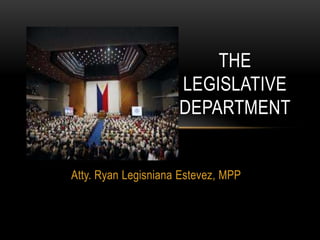
The legislative department
- 1. THE LEGISLATIVE DEPARTMENT Atty. Ryan Legisniana Estevez, MPP
- 2. THE LEGISLATIVE DEPARTMENT • The Congress of the Philippines (Filipino: Kongreso ng Pilipinas) is the national legislature of the Republic of the Philippines. It is a bicameral body consisting of the Senate (upper chamber), and the House of Representatives (lower chamber) although commonly in the Philippines the term congress refers to the latter.
- 3. THE SENATE • The Senate is composed of 24 senators half of which are elected every three years. Each senator, therefore, serves a total of six years. The senators are elected by the whole electorate and do not represent any geographical district.
- 4. THE HOUSE OF REPRESENTATIVES • The House of Representatives is composed of a maximum of 250 congressmen. There are two types of congressmen: the district and the sectoral representatives. The district congressmen represent a particular geographical district of the country. All provinces in the country are composed of at least one congressional district. Several cities also have their own congressional districts, with some composed of two or more representatives.
- 5. PARTY LIST REPRESENTATIVES • The sectoral congressmen represent the minority sectors of the population. This enables these minority groups to be represented in the Congress, when they would otherwise not be represented properly through district representation. Also known as party-list representatives, sectoral congressmen represent labor unions, rights groups, and other organizations.
- 6. SESSIONS • The Constitution provides that the Congress shall convene for its regular session every year beginning on the 4th Monday of July. A regular session can last until thirty days before the opening of its next regular session in the succeeding year. The President may, however, call special sessions which are usually held between regular legislative sessions to handle emergencies or urgent matters.
- 7. POWERS OF THE LEGISLATURE • General legislative power It consists of the enactment of laws intended as a rule of conduct to govern the relation between individuals (i.e., civil laws, commercial laws, etc.) or between individuals and the state (i.e., criminal law, political law, etc.).
- 8. POWERS OF THE LEGISLATURE • Implied powers It is the essential to the effective exercise of other powers expressly granted to the assembly.
- 9. INHERENT POWERS These are the powers which though not expressly given are nevertheless exercised by the Congress as they are necessary for its existence such as: • to determine the rules of proceedings; • to compel attendance of absent members to obtain quorum to do business; • to keep journal of its proceedings; etc.
- 10. SPECIFIC LEGISLATIVE POWERS It has reference to powers which the Constitution expressly and specifically directs to perform or execute. Powers enjoyed by the Congress classifiable under this category are: • Power to appropriate; • Power to act as constituent assembly; (The Senate and the House of Representatives must convene and vote on joint or separate session to do this.) • Power to impeach; (to initiate all cases of impeachment is the power of the House of Representatives; To try all cases of impeachment is the power of the Senate.)
- 11. SPECIFIC LEGISLATIVE POWERS • Power to confirm treaties;(Only the Senate is authorized to use this power.) • Power to declare the existence of war; (The Senate and the House of Representatives must convene in joint session to do this.) • Power to concur amnesty; and • Power to act as board of canvasser for presidential/vice- presidential votes. (by creating a joint congressional committee to do the canvassing.)
- 12. SPECIFIC LEGISLATIVE POWERS • Power to contempt • Blending of power • Delegation of power • Budgetary power • Power of taxation
- 13. EXECUTIVE POWER Powers of the Congress that are executive in nature are: • Appointment of its officers; • Affirming treaties; • Confirming presidential appointees through the Commission on Appointments; • Removal power;
- 14. SUPERVISORY POWER The Congress of the Philippines exercises considerable control and supervision over the administrative branch - e.g.: • To decide the creation of a department/agency/office; • To define powers and duties of officers; • To appropriate funds for governmental operations; • To prescribe rules and procedure to be followed; etc.
- 15. ELECTORAL POWER Considered as electoral power of the Congress of the Philippines are the Congress' power to: • Elect its presiding officer/s and other officers of the House; • Act as board of canvassers for the canvass of presidential/vice- presidential votes; and • Elect the President in case of any electoral tie to the said post.
- 16. JUDICIAL POWER Constitutionally, each house has judicial powers: • To punish its Members for disorderly behavior, and, with the concurrence of two-thirds of all its Members, suspend or expel a Member • To concur and approve amnesty declared by the President of the Philippines; • To initiate, prosecute and thereafter decide cases of impeachment; and • To decide electoral protests of its members through the respective Electoral Tribunal.
- 17. MISCELLANEOUS POWERS The other powers of Congress mandated by the Constitution are as follows: • To authorize the Commission on Audit to audit fund and property; • To authorize the President of the Philippines to fix tariff rates, quotas, and dues; • To authorize the President of the Philippines to formulate rules and regulations in times of emergency;
- 18. MISCELLANEOUS POWERS • To reapportion legislative districts based on established constitutional standards; • To implement laws on autonomy; • To establish a national language commission; • To implement free public secondary education;
- 19. MISCELLANEOUS POWERS • To allow small scale utilization of natural resources; • To specify the limits of forest lands and national parks; • To determine the ownerships and extent of ancestral domain; and • To establish independent economic and planning agency.